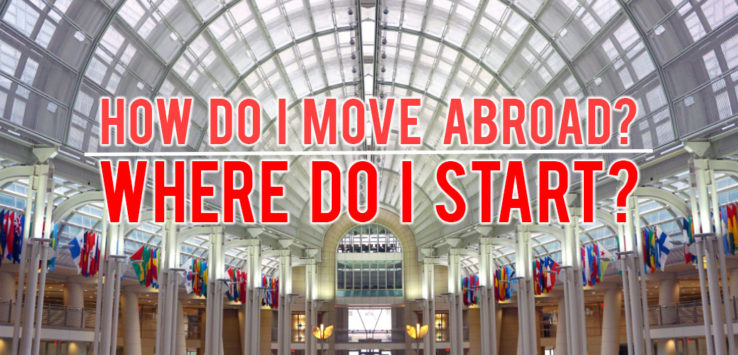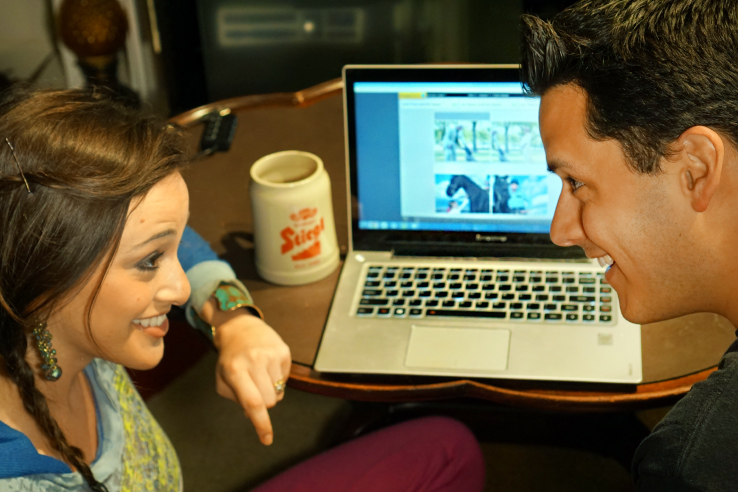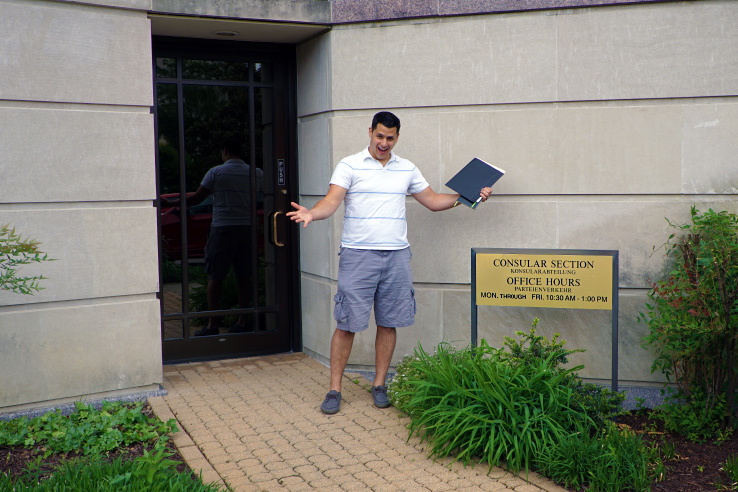
For us, it was a mission to move abroad to Europe. We were determined to get out of our comfort zone and relocate our entire world. Even if it was just for a few years.
It all sounded so glamorous: living in a foreign country, traveling Europe. But also advantageous for our future: learning another language, interacting with other cultures.
But where would we go? How would we go? Can we even legally live in a foreign country for years at a time? We had absolutely no idea, but we were determined to find out.
So we decided to take it one step at a time. Giving this decision the groundwork and research that is required for a successful move abroad.
First up?
Basic Research.
The first and most important information to research is how to officially stay long term. It sounds simple, but it’s KEY. The last thing you want is to risk being detained and not allowed back into the world you’ve grown to love because you decided to hop on a plane and just ‘figure it out.’
Do it right from the beginning. You will feel more relaxed and able to enjoy every moment to the fullest.
Knowing many countries in Europe are harder to stay for extended periods of time, we began our online research. Seems like such a simple start, but there is no reason to reinvent the wheel here. If you dig enough, you will find all the answers.
From past travelers’ blogs to embassy websites, we should be able to come up with a starting point. Right?
With our first discovery, came our first road block – No US traveler can stay in Europe (Schengen countries) for longer than 90 days within a period of 6 months.

Countries included in the Schengen Area:
Austria, Belgium, Czech republic, Denmark, Estonia, Finland, France, Germany, Greece, Hungary, Iceland, Italy, Latvia, Lithuania, Luxembourg, Malta, Netherlands, Norway, Poland, Portugal, Slovakia, Slovenia, Spain, Sweden, Switzerland, Liechtenstein
Countries not included in the Schengen Area:
Bulgaria, Croatia, Cyprus, Ireland, Romania and the United Kingdom
Luckily, for citizens of most countries (including the USA), no visa is required, but the 90 day rule holds true. So we’d need to make this official.
We couldn’t simply hop on a plane. We needed a long term visa situation. At least to get us started and prepared for a more permanent situation – like a Residence Permit.
So the research continued.
We quickly realized that we needed to focus on ONE destination. Every country has different requirements, and if we didn’t choose 1 single country, we’d get lost in all our research.
And that’s when we decided on Salzburg, Austria.
But why Austria?
- Erin husband’s father is from Salzburg, so we had family support to help us.
- It’s at a prime location, right in the center of Europe.
- There’s mountains, 4 incredible seasons and lakes galore.
- It’s affordable.
- The food, the people – all top notch.
Unfortunately, we could NOT speak German, but we were ready and willing to learn.
When you’re choosing a country, try to focus on a country with something familiar and comfortable to you.
Maybe you know conversational Spanish, so you decide to move to Spain. Or you have a distant relative who lives in Italy or a best friend that moved to Paris. Giving yourself a crutch to keep you stable is helpful when everything else is so foreign.
If you’ve got nothing in Europe that can be familiar to you, make a list of 5 countries that you’d be interested in living, pros and cons, and start from there.
Or maybe choose your destination according to work possibilities.
Are there certain countries where your job can relocate you?
This is an automatic first question to ask yourself.
Can you transfer at work to an office abroad? Would your work connections help you? Are there jobs in your industry that only require you to speak English you can apply for in other countries?
These are all real and important things to consider. And can also help make your dream to move abroad come true, a little easier.
If not, totally fine. There are MANY ways to move abroad without work relocating you there. But if that’s the case, put that thought in the back of your brain and save it for later. Since you have no work guarantee, you need to figure out how to stay without it.
Okay, so your country is chosen. Now what?
Straight to the Embassy!
The next place we turned to was the Austrian embassy website, which contains the most official information regarding travel and visas. Here, we learned there are a few visas options available to us.
One in particular Visa D, would allow us to stay for up to 180 days. A much more comfortable solution than having to leave after 3 months and figure out what’s next. From what we read, it seemed perfect.
We could fly to Austria, stay for 6 months and then figure out our next option while we were living there.
Just to be sure we are on the right track; we made an appointment with the Austrian Embassy here in DC. Technically, appointments are for visa applications only – not for general information, and you can only apply 3 months or less before travel. BUT we needed answers right away, and since we lived only 15 minutes away, the embassy was our best bet.
That is my GREATEST recommendation to you.
Use your local embassy to get your questions answered.
The ‘local’ embassy for the country you’re moving to might be in another state or even a flight away from where you live. For a full list of embassy locations, visit this Complete List of Foreign Embassies and Consulates in the United States
But this step is not necessarily easy with simple answers given right away. You’re going to hear a million different things. You might even grow SUPER frustrated because your questions are not being answered, but don’t give up.
And come to THEM with as much research as you can find. The person you want to get in touch with is the Consular Officer. Ask them as many questions as you want and don’t be shy or feel like you’re being annoying. Who cares?! Being persistent is how you’ll get the job done.
The Consular Officer will have all Visa and Residence Permit information at their disposal. Explain your intentions and become their very best friend. The Consular Officer at the Austrian Embassy was a huge reason why our move abroad worked out. And it’s because we didn’t leave her alone!
So why go to the embassy first?
It is important to make the process as official as possible before departure, while you’re in your home country and have all the information before you move forward. The more rules you follow and the more knowledge you have = the more comfortable your move abroad will be.
Time to network.
If you’re trying to move to Italy, Google “Expat in Italy blog” or “move abroad to Italy blog” and REACH OUT to the writers/bloggers. What better person to ask advice than someone who’s literally done it? They will understand what you’re going through and I promise, they will be supportive and offer good advice.
It’s a process only those who’ve done it truly understand, a common ground that’s refreshing and exciting to come across – for both the blogger and you.
And remember this…
During this initial step of research and figuring out your Visa situation, no physical action takes place here. It’s not the time to start selling your things or finding a place to live.
What you CAN do is start saving and adjusting your finances. Even though you don’t know exactly how much money you need, it’s never too early to be conscious of your spending.
But most importantly, this is the time to RESEARCH and figure out just how you’re going to do this.
Once you know your Visa or Residence Permit requirements, THEN you can set a strict budget and start taking action. Knowing the requirements will give you a timeline and give you a monetary goal.
Disclaimer:
We know this is not as cut and dry as you’d want it to be (trust me, if anyone understands it’s US!)
There is no way for us to tell you exactly what you need to do to move abroad to Europe. Every country is different. Requirements are different. Every situation is different. And rules change annually. But when you want something with all your heart and are willing to do whatever it takes, you will make it happen. We are living proof.
The point, at first, is to lay the groundwork for a successful road ahead. Leaving little room for surprises and unexpected obstacles in the future (although some are unavoidable!) That is why you need to take time to research, research…and RESEARCH! Until you are the master of knowledge for all things relating to living in your new European home.
Give this first step the time and energy it deserves and make sure to not get ahead of yourself until you’re sure of the process. The key is taking it one step at a time. So start off on the right foot.
Gather ALL the information you need and then move forward with even more passion and conviction than you started with. And you too will succeed.










